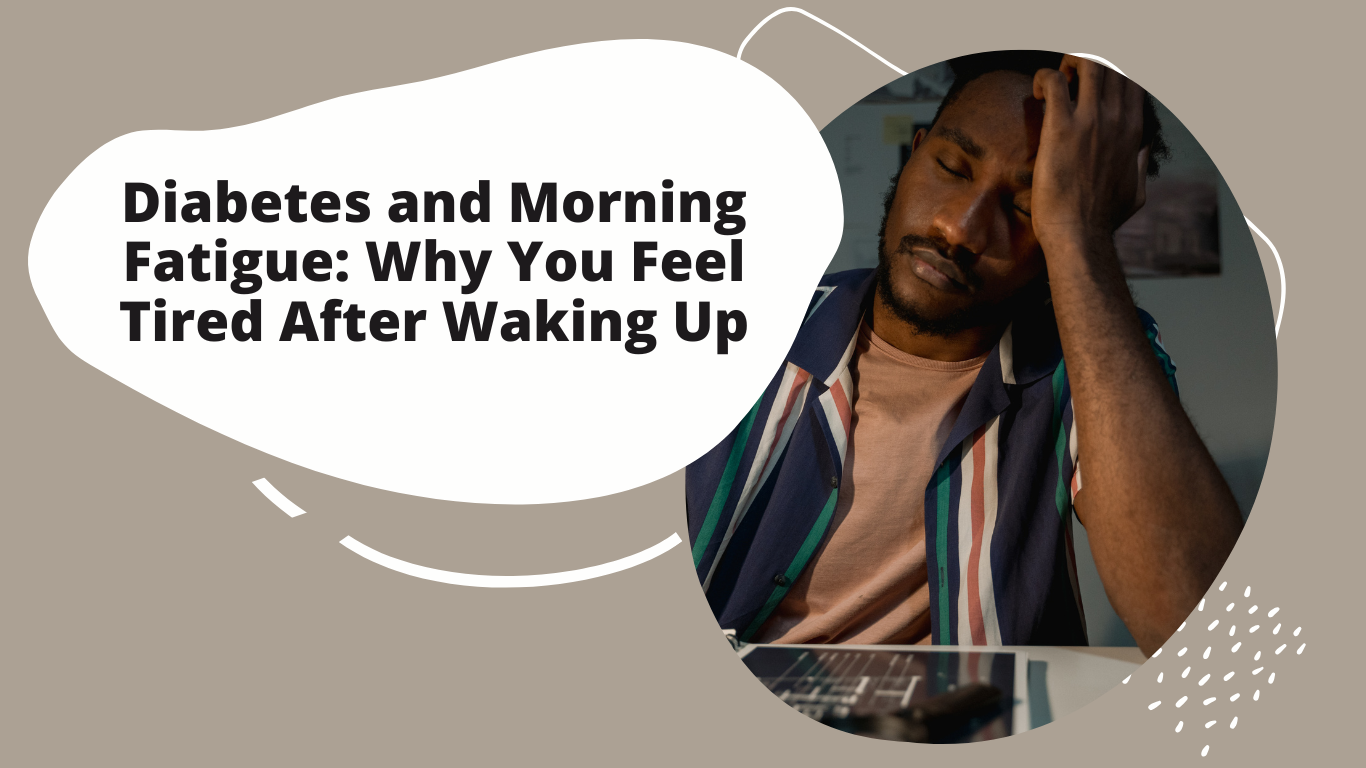Diabetes and Morning Fatigue: Why You Feel Tired After Waking Up

Diabetes and Morning Fatigue: Why You Feel Tired After Waking Up
Waking up tired, despite getting a full night’s sleep, is a frustrating experience—especially for those with diabetes. If you often feel exhausted in the morning, your diabetes might be playing a bigger role than you realize. But why does this happen, and what can you do about it? In this blog post, we’ll explore the key reasons diabetes contributes to morning fatigue and provide practical tips to help you wake up feeling refreshed and energized.
Why Does Diabetes Cause Morning Fatigue?
Fatigue is one of the most common symptoms of diabetes, and it can hit especially hard in the morning. Here’s why:
1. Blood Sugar Imbalances
Your body relies on stable blood sugar levels for energy. But when you have diabetes, your blood sugar can be too high (hyperglycemia) or too low (hypoglycemia), leading to extreme tiredness:
- Hyperglycemia: High blood sugar overnight makes it difficult for your body to efficiently convert glucose into energy, leaving you feeling sluggish when you wake up.
- Hypoglycemia: If your blood sugar drops too low during sleep, your body experiences stress, disrupting rest and making you feel drained in the morning.
2. Interrupted Sleep Due to Diabetes Symptoms
- Frequent urination (Nocturia): High blood sugar forces your kidneys to work overtime, making you wake up multiple times at night to use the bathroom.
- Restless Leg Syndrome (RLS): This condition, common in diabetics, causes discomfort in the legs, making it hard to fall and stay asleep.
- Obstructive Sleep Apnea (OSA): Diabetes increases the risk of sleep apnea, which causes breathing interruptions and severely impacts sleep quality.
- Nighttime Hypoglycemia: Low blood sugar episodes during sleep can cause night sweats, nightmares, and sudden awakenings.
3. Insulin Resistance and Low Energy
For those with type 2 diabetes, insulin resistance prevents glucose from properly entering cells. This lack of energy at the cellular level leads to chronic fatigue, no matter how much sleep you get.
4. Inflammation and Stress Hormones
Chronic inflammation, often associated with diabetes, can trigger feelings of tiredness. Additionally, if your body has an altered cortisol response (the stress hormone), you might wake up feeling groggy instead of refreshed.
5. Medications and Their Side Effects
Some diabetes medications can cause drowsiness or fluctuations in blood sugar levels, which can contribute to morning fatigue. If you suspect your medication is affecting your energy levels, talk to your doctor about possible adjustments.
How to Fight Morning Fatigue with Diabetes
The good news? There are many ways to combat diabetes-related fatigue and improve your mornings.
1. Stabilize Your Blood Sugar Levels
- Monitor your blood sugar before bed and after waking up.
- Avoid late-night high-carb or sugary snacks.
- Work with your doctor to adjust insulin or medication if needed.
2. Prioritize Sleep Hygiene
- Stick to a consistent sleep schedule.
- Avoid caffeine and heavy meals before bedtime.
- Keep your bedroom cool, dark, and comfortable.
- If you suspect sleep apnea, consult a doctor for diagnosis and treatment.
3. Stay Hydrated
Dehydration is common in diabetics and can lead to morning sluggishness. Make sure you’re drinking enough water throughout the day and avoid excessive alcohol or caffeine before bedtime.
4. Incorporate Regular Exercise
Exercise helps regulate blood sugar, improves insulin sensitivity, and promotes better sleep. Try to get at least 30 minutes of moderate exercise most days of the week.
5. Manage Stress and Mental Health
Chronic stress can worsen fatigue, so it’s important to find ways to relax. Practices like deep breathing, meditation, and gentle yoga can help reduce stress and improve overall energy levels.
6. Check for Nutrient Deficiencies
Deficiencies in iron, vitamin D, and B vitamins can contribute to fatigue. Eating a balanced diet rich in whole foods, lean proteins, and healthy fats can support sustained energy levels.
FAQs About Diabetes and Morning Fatigue
1. Why do I wake up exhausted even when my blood sugar is normal?
Even with stable blood sugar levels, other factors like poor sleep quality, stress, dehydration, or medication side effects can contribute to fatigue. Evaluating your overall health and lifestyle can help pinpoint the cause.
2. How can I tell if my fatigue is related to diabetes or another condition?
If your fatigue comes with excessive thirst, frequent urination, blurry vision, or unexplained weight changes, it might be linked to diabetes. However, conditions like anemia, thyroid issues, and depression can also cause fatigue—so it’s best to consult a doctor for a full evaluation.
3. Is drinking coffee a good way to manage diabetes-related fatigue?
Coffee can provide a temporary energy boost, but excessive consumption can lead to blood sugar fluctuations and dehydration. Moderation is key.
4. How does stress impact morning fatigue?
Stress raises cortisol levels and can disrupt sleep, making fatigue worse. Stress management techniques like meditation, deep breathing, and exercise can help improve energy levels.
5. Should I change my diet to reduce morning fatigue?
Yes! A balanced diet with complex carbohydrates, lean proteins, and healthy fats can help stabilize blood sugar and energy levels. Avoiding processed sugars and refined carbs before bedtime can also prevent overnight blood sugar spikes and crashes.
Final Thoughts
Morning fatigue with diabetes can be frustrating, but it’s not something you have to live with. By focusing on blood sugar control, improving sleep quality, managing stress, and maintaining a healthy lifestyle, you can wake up feeling more refreshed and ready to take on the day.
